It looks like you're using an Ad Blocker.
Please white-list or disable AboveTopSecret.com in your ad-blocking tool.
Thank you.
Some features of ATS will be disabled while you continue to use an ad-blocker.
share:
Originally posted by Gmoneycricket
Daily bee swarms?
During the dry season we see a swarm that leaves from behind the mountain around 9am, and then I assume the same swarm returns back over the mountain at 3pm, as we can see the black cloud and hear it twice a day.
I have always just assumed they were gathering pollen and water in a group.
I want bees we have lots around us all day, every day as we have gardens and they come to enjoy the resources.
But in this part of Arizona we have lots of African Bees, so we have several swarms stop by every year, so I fear I may collect the wrong swarm of aggressive. On days when aggressive bees come for resources we can tell as they warn you by ramming you in the forehead to back off. We go in or give those groups lots of space.We can not have the aggressive removed because we have no idea where they are we have miles and miles of empty desert in every direction.
Did not mean to ramble, we hear of bee shortages when we have thousands around us every day, so wanted to share, no shortage here.
You speak the truth.
It is estimated that in Arizona there are about 250,000 wild bee colonies. They nest in a wide variety of locations, so be alert for groups of flying bees entering or leaving an opening. Listen for buzzing sounds. Be especially alert when climbing because bees will often nest under rocks or within crevices.
Please read the source article Here.
They are also considered an invasive species. They are still honeybees. What you are seeing are 6 week swarms which is the rate African bees swarm at, as opposed to European bees, which is once or twice a year. African bees are mean and aggressive, thus the term "killer bee". It takes roughly 1100-1500 bee stings to kill you, and as the European swarms are docile, a swarm of Africanized bees are more likely to sting you, especially if agitated.
Here's their nature: Years of evolution has made them adapt in harsh environments. The queen must lay many more eggs, to keep the hive populated. Many workers die off in the solo flights looking for pollen and not finding it, and fewer resources are brought into the hive, so the queen reacts by producing more and more bees, and the hive has to swarm more often to keep the population at a sustainable level. A new swarm every 6 weeks ensures the survival of their species. It's the way they are.
I would not try to raise an Africanized hive. I would burn it. That is one reason the Bee Inspector is your friend. He can spot them. I personally couldn't tell the difference, but I'd know by the way my hives reacted to me.
reply to post by Druid42
I have had to kill 3 swarms that have moved into patio, garages etc. in in the last year, because as you say you can tell the aggressive ones. We have been lucky this summer, we got lots of rain so they have not come here looking for water, less stings, less problems. We have the gear for when it needs to be done.
And when the swarms come in if they don't move on, I make lots of smoke to convince them to, move along because if its dry I may start a brush fire if I try to destroy with fire. Good news is we have have good bees that coexist with us not sure if they are wild or from BLM or ranchers hives.
Thanks for your input I may call on you if I need opinion in future.
I have had to kill 3 swarms that have moved into patio, garages etc. in in the last year, because as you say you can tell the aggressive ones. We have been lucky this summer, we got lots of rain so they have not come here looking for water, less stings, less problems. We have the gear for when it needs to be done.
And when the swarms come in if they don't move on, I make lots of smoke to convince them to, move along because if its dry I may start a brush fire if I try to destroy with fire. Good news is we have have good bees that coexist with us not sure if they are wild or from BLM or ranchers hives.
Thanks for your input I may call on you if I need opinion in future.
reply to post by Gmoneycricket
Smoking is the best way to displace them, but rather you killed them. They are invasive, and in your area, quite prolific. In your case, think of termites in your house. You don't want them. It's a mission. Eventually, the aggression can be bred back out, but it'll take a while.
Good to see you know how to deal with them. Bees (of any kind) can't fly in high humidity. Wet weather keeps the hives tending towards dormancy. We had a wet spring, and got a late start on honey production.
Thanks for posting.
Smoking is the best way to displace them, but rather you killed them. They are invasive, and in your area, quite prolific. In your case, think of termites in your house. You don't want them. It's a mission. Eventually, the aggression can be bred back out, but it'll take a while.
Good to see you know how to deal with them. Bees (of any kind) can't fly in high humidity. Wet weather keeps the hives tending towards dormancy. We had a wet spring, and got a late start on honey production.
Thanks for posting.
Oh, and BTW, for those of you following this thread, I am going to insert the bee escapes Friday, and we will give them 2 days to vacate 3 supers
each. That moves extraction to Sunday.
I'll add in a bit of video and/or pics before the extraction, as I talked to Dad tonight and we need to do a final assessment on the hives before we decide where to put the bee escapes, and on Friday we are also going to drag out the extraction equipment, and get it set up for extracting on Sunday.
I know you guys are wondering what the heck a three frame extractor is. I'll be showing you our set-up for extraction. You'll get a first hand look at how honey comes from the hives, and into a honey jar. 230 pounds of honey? I say that's a high figure. You'll watch it here on this thread. Stay tuned.
I'll add in a bit of video and/or pics before the extraction, as I talked to Dad tonight and we need to do a final assessment on the hives before we decide where to put the bee escapes, and on Friday we are also going to drag out the extraction equipment, and get it set up for extracting on Sunday.
I know you guys are wondering what the heck a three frame extractor is. I'll be showing you our set-up for extraction. You'll get a first hand look at how honey comes from the hives, and into a honey jar. 230 pounds of honey? I say that's a high figure. You'll watch it here on this thread. Stay tuned.
I am looking forward to it
I want to see the sweetness of the
stings we have experienced,
while they collect the pollen
of the flowers we all share.
I want to see the sweetness of the
stings we have experienced,
while they collect the pollen
of the flowers we all share.
S&F, thanks for this thread.
I've been lurking on beekeepers forums for a while now, just trying to soak up as much info as possible. I'd love to have my own hives, but I'm in a suburban neighborhood, and I do not think my neighbors would like it much. Once of these days when I have some land, this will be one of the first things we do!
I've been lurking on beekeepers forums for a while now, just trying to soak up as much info as possible. I'd love to have my own hives, but I'm in a suburban neighborhood, and I do not think my neighbors would like it much. Once of these days when I have some land, this will be one of the first things we do!
Adding updates:
We are getting ready to extract honey from our four hives. It was a rainy beginning to the pollen flow this spring, and it was rainy in the fall too. Honey production wasn't up to par due to those factors. We checked all four hives today, and the bees didn't even touch two supers. We thought they would be filled.
But that's the cards mother nature deals you. You only can keep the hives, you can't control them. It's perfect balance with nature. Here's a thumb of the hive assessment this year. I set my smartphone to date stamp everything now. Hey, who knows when I'll be tending bees, look up, and see a UFO?

So we're talking about extraction, and the biggest question is how do you get the bees out of the honey super? There's these little gadgets called bee escapes. They allow one-way travel through a hive, and you rearrange supers and put them in the over board, so all the bees leave, and can't get back in. Here's what they look like:

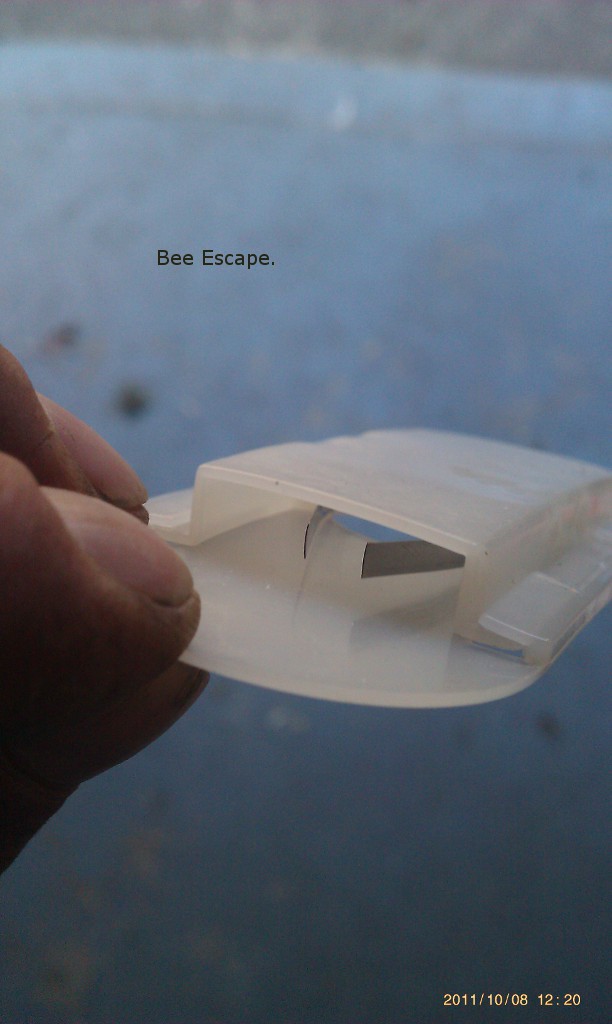
And so, we have to decide which supers we can extract, the surplus, and where to insert those little gadgets in the hive. Here's the assessment:
Hive 1: Two supers full. Flipped the top empty super to the bottom, added a bee escape, and placed the two full supers back on top. Good hive, 100 US lbs. of honey.
Hive 4: First super with a few brood cells, second with 50% honey, no capped cells. Kept static, just inspected. New swarm this year, did not expect to be productive. Next year it will kick @ss. I expect 100 US lbs. at least.
Hive 3: The hive that made Hive 4. Moderate production, weak after the swarm, left static, and no honey extraction.
Hive 2: One super full, 50 lbs. Switched supers to put empty on bottom, a bee escape, then 1 super for extraction above.
I took pics of Hive 2, thought you might like them. One of them has a crystal clear pic of bees in action, but I Gimp'd it with text, so it's not a classic, but I have the original at 3224x1264, something crazy for rez, the phone does 8 MP, aye? A beautiful pic, I thought.
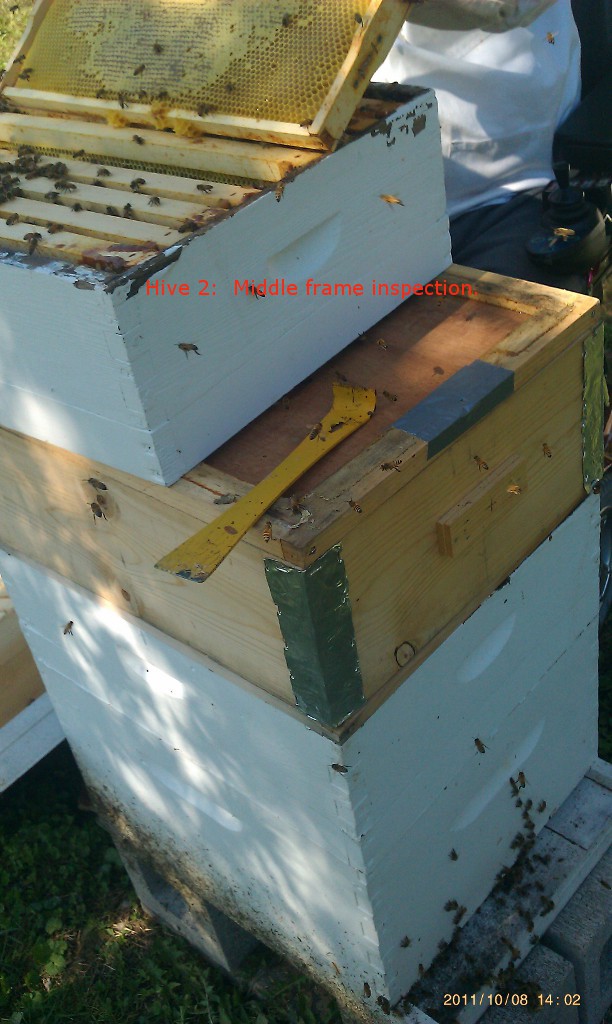
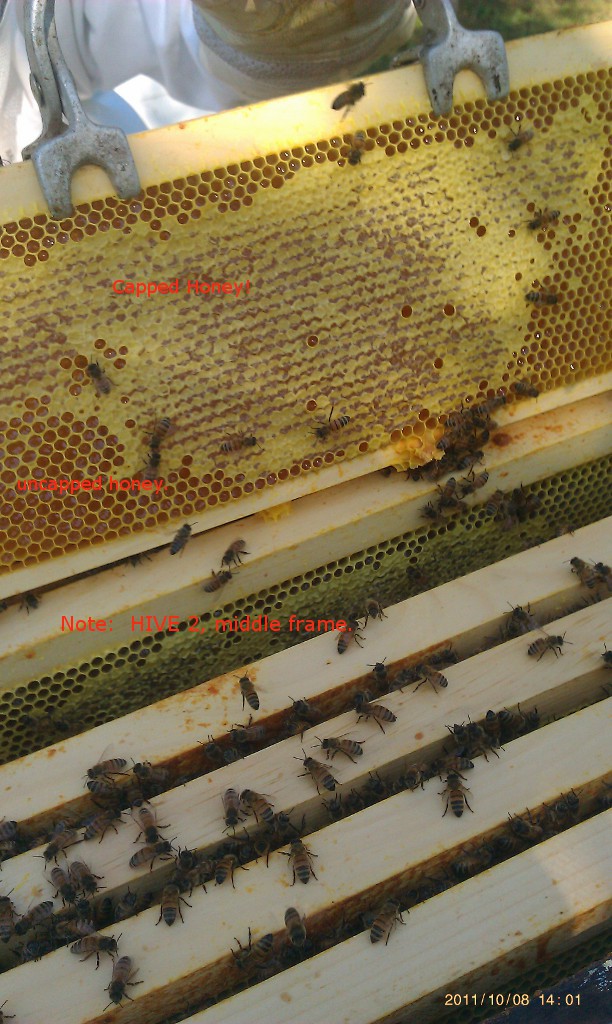
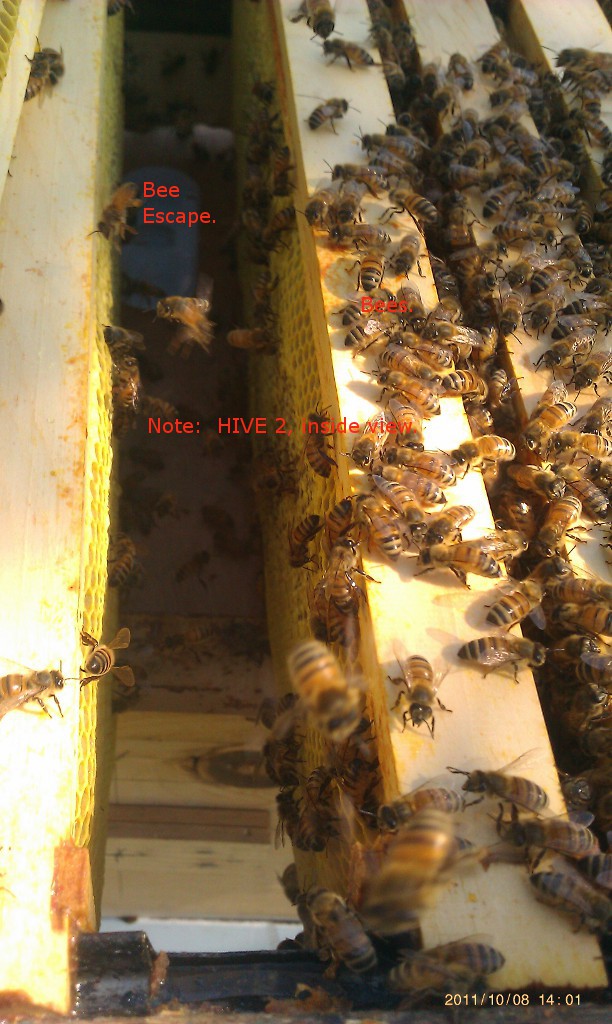
I really liked the contrast of this pic. Bees in 3-D, stop motion.
So we are down to the equipment to make this all happen. I fetched it out of storage, and it needed a lot of cleaning:
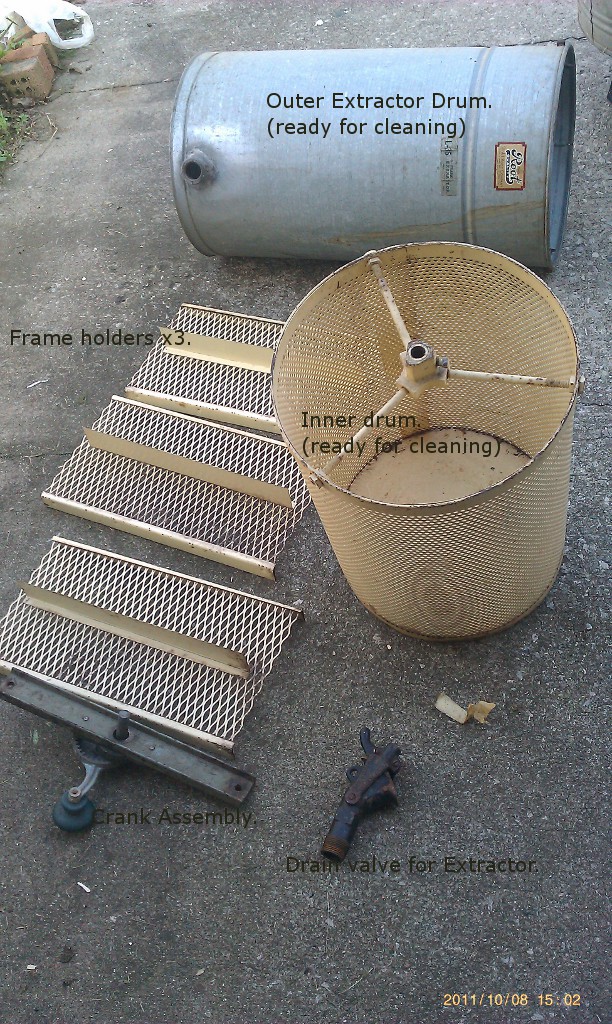
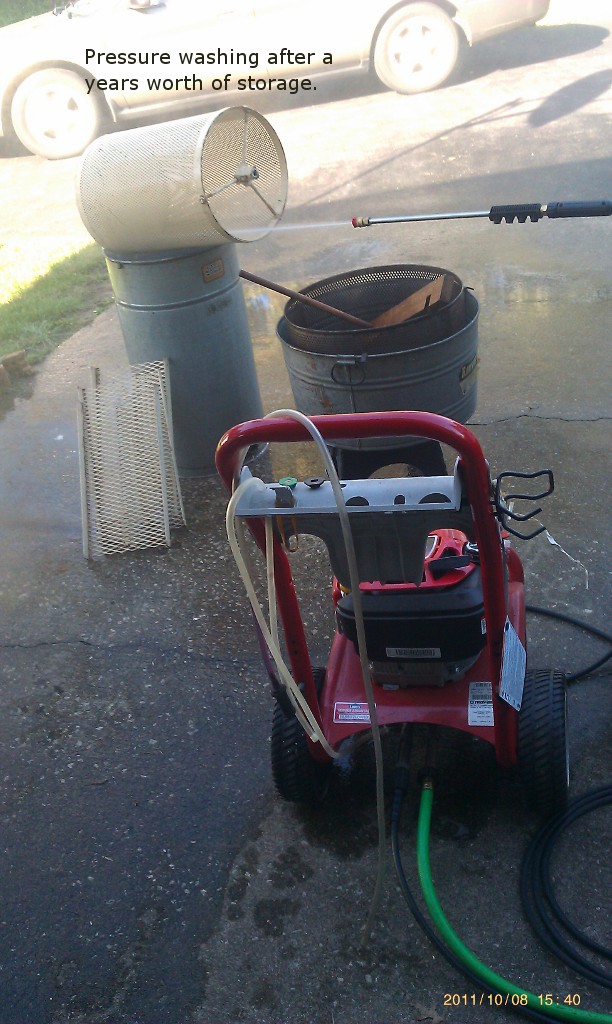
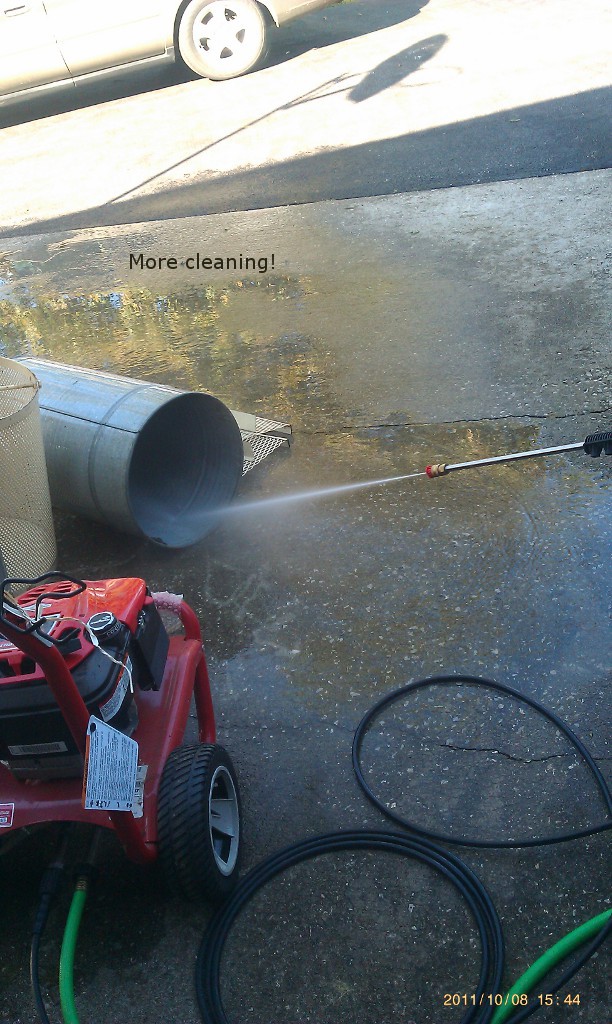
Here's is the de-capping assembly you'll see in action tomorrow:
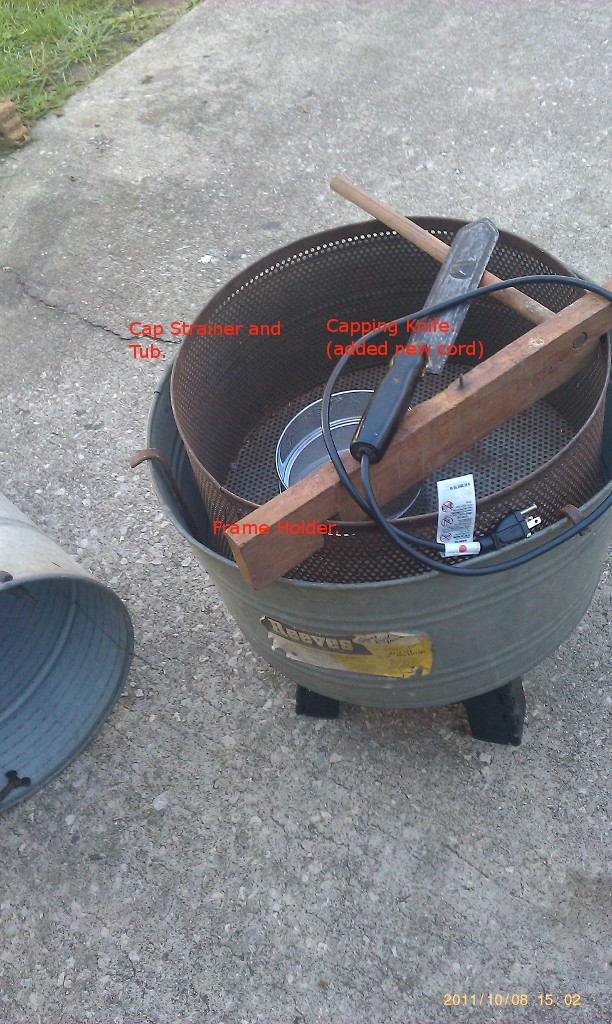
Stay Tuned.......
We are getting ready to extract honey from our four hives. It was a rainy beginning to the pollen flow this spring, and it was rainy in the fall too. Honey production wasn't up to par due to those factors. We checked all four hives today, and the bees didn't even touch two supers. We thought they would be filled.
But that's the cards mother nature deals you. You only can keep the hives, you can't control them. It's perfect balance with nature. Here's a thumb of the hive assessment this year. I set my smartphone to date stamp everything now. Hey, who knows when I'll be tending bees, look up, and see a UFO?

So we're talking about extraction, and the biggest question is how do you get the bees out of the honey super? There's these little gadgets called bee escapes. They allow one-way travel through a hive, and you rearrange supers and put them in the over board, so all the bees leave, and can't get back in. Here's what they look like:


And so, we have to decide which supers we can extract, the surplus, and where to insert those little gadgets in the hive. Here's the assessment:
Hive 1: Two supers full. Flipped the top empty super to the bottom, added a bee escape, and placed the two full supers back on top. Good hive, 100 US lbs. of honey.
Hive 4: First super with a few brood cells, second with 50% honey, no capped cells. Kept static, just inspected. New swarm this year, did not expect to be productive. Next year it will kick @ss. I expect 100 US lbs. at least.
Hive 3: The hive that made Hive 4. Moderate production, weak after the swarm, left static, and no honey extraction.
Hive 2: One super full, 50 lbs. Switched supers to put empty on bottom, a bee escape, then 1 super for extraction above.
I took pics of Hive 2, thought you might like them. One of them has a crystal clear pic of bees in action, but I Gimp'd it with text, so it's not a classic, but I have the original at 3224x1264, something crazy for rez, the phone does 8 MP, aye? A beautiful pic, I thought.



I really liked the contrast of this pic. Bees in 3-D, stop motion.
So we are down to the equipment to make this all happen. I fetched it out of storage, and it needed a lot of cleaning:



Here's is the de-capping assembly you'll see in action tomorrow:

Stay Tuned.......
edit on 10/8/11 by Druid42 because: changed an on to of. spelling glitch.
Thank you Druid42 for this informative thread. I appreciate your time and effort to demonstrate to us newbies how our most valuable food source is
produced and collected.I will stayed tune for your extraction process.
Awesome! I'm in the learning stage of Bee Keeping,and this thread is invaluable,filled with knowledge and images that are inspiring for anyone
wanting to be a Keeper. I'll be following your updates and cant wait to see more.
My husband and I are hoping to spend this Winter building our first box. Any thoughts on the top hang type as an alternative to the traditional frame type you use? I have a link I'll post if you want,so you can see what I'm referring to.
Honey bees,one of our most precious natural resources. Thank you so much for investing your thought and time in us. I,for one,am extremely grateful to you Druid.
My husband and I are hoping to spend this Winter building our first box. Any thoughts on the top hang type as an alternative to the traditional frame type you use? I have a link I'll post if you want,so you can see what I'm referring to.
Honey bees,one of our most precious natural resources. Thank you so much for investing your thought and time in us. I,for one,am extremely grateful to you Druid.
reply to post by Druid42
I'm so happy to see you started a thread on bee keeping!
It's interesting to hear about it from someone who is personally doing it and can answer questions. Your pictures are great, too!
I always thought the queen was the only female involved, so thanks for teaching me something new about the bees themselves as well as the ins and outs of bee keeping. But, like I said in my other thread about bees, I still wish this could be a job for just one or two people.
Thanks again for putting an organized, educational, and fascinating thread together, Druid. S&F
I'm so happy to see you started a thread on bee keeping!
It's interesting to hear about it from someone who is personally doing it and can answer questions. Your pictures are great, too!
I always thought the queen was the only female involved, so thanks for teaching me something new about the bees themselves as well as the ins and outs of bee keeping. But, like I said in my other thread about bees, I still wish this could be a job for just one or two people.
Thanks again for putting an organized, educational, and fascinating thread together, Druid. S&F
reply to post by Qouth The Raven
Yes, I'd like if you post your link, as I'm kinda curious. Such a hive config would depend on your geo-graphic location. Our setup is pretty much standard. We really don't do anything fancy.
Thanks for your comments.
Yes, I'd like if you post your link, as I'm kinda curious. Such a hive config would depend on your geo-graphic location. Our setup is pretty much standard. We really don't do anything fancy.
Thanks for your comments.
I always thought the queen was the only female involved, so thanks for teaching me something new about the bees themselves as well as the ins and outs of bee keeping. But, like I said in my other thread about bees, I still wish this could be a job for just one or two people.
My dad is a paraplegic, and I am the only abled-body doing this. I could do this on my own. So our set-up is run by 1 and a half people, but it's not about the work involved, it's about sharing time together, and sharing knowledge, and producing honey. My point is is that one person can run a small honey farm. Don't ever sell your skills short....
A most interesting and informative post, Druid.
Is this a skill that can be learned or is it one that comes "naturally"?
I can imagine that, when TSHTF, honeybees and their keepers will be a most precious resource.
Peace
i knew you were a cutie
Is this a skill that can be learned or is it one that comes "naturally"?
I can imagine that, when TSHTF, honeybees and their keepers will be a most precious resource.
Peace
i knew you were a cutie
edit on 10/11/2011 by TNTarheel because: formatting
reply to post by TNTarheel
Uhm, it's a learned skill. Definitely. As with any skill, you can make mistakes. We did, and now extraction is pushed to Wednesday. My boo-boo? I forgot to cover the supers, once removed from the hive, and the bees had a honey free for all. We got 2 US lbs of Goldenrod honey extracted before our equipment was covered in bees. Had to set everything outside, and let the bees work till they cleaned it all back up, and went back home for the night. I have pics, but I'm a bit too embarrassed to post them right now. LOL.
TNT, thanks for visiting!
*blushes at the cutie comment*
Uhm, it's a learned skill. Definitely. As with any skill, you can make mistakes. We did, and now extraction is pushed to Wednesday. My boo-boo? I forgot to cover the supers, once removed from the hive, and the bees had a honey free for all. We got 2 US lbs of Goldenrod honey extracted before our equipment was covered in bees. Had to set everything outside, and let the bees work till they cleaned it all back up, and went back home for the night. I have pics, but I'm a bit too embarrassed to post them right now. LOL.
TNT, thanks for visiting!
*blushes at the cutie comment*
reply to post by Druid42
Top Bar Hive
We are up in beautiful Washington State,so any thoughts and advice you have will be greatly appreciated. I buy and eat local honey,Wildflower is my favorite,so I know that keeping bees is done with success up here.Our cold months are longer in duration than our warm months,so I'm wondering how bees are wintered over up here. I have alot of research to do!
Top Bar Hive
We are up in beautiful Washington State,so any thoughts and advice you have will be greatly appreciated. I buy and eat local honey,Wildflower is my favorite,so I know that keeping bees is done with success up here.Our cold months are longer in duration than our warm months,so I'm wondering how bees are wintered over up here. I have alot of research to do!
reply to post by Druid42
Darn fine piece you did here my friend. You actually got my interest. And I am allergic to them!!
I just saw a piece about a new theory about the bees dying off. Diesle Fuel fumes. Hmmm.
Darn fine piece you did here my friend. You actually got my interest. And I am allergic to them!!
I just saw a piece about a new theory about the bees dying off. Diesle Fuel fumes. Hmmm.
I wanted to add that there are hives that are placed in a little 'grove' here in the late spring,then are moved again in the fall. I've never
approached them,or seen the Keeper there to ask him/her about this practice.
Do you move your hives depending on the season? It gets real cold up here and some years,we get alot of snow. I know that hives need to be covered/insulated and food made available for the bees..I guess my question is;Is wintering a hive over indoors advisable in a climate like mine?
I always wonder where those hives go when they aren't out in that little grove..
Do you move your hives depending on the season? It gets real cold up here and some years,we get alot of snow. I know that hives need to be covered/insulated and food made available for the bees..I guess my question is;Is wintering a hive over indoors advisable in a climate like mine?
I always wonder where those hives go when they aren't out in that little grove..
Top Bar Hivereply to
post by Druid42
That's the link right to the page with the info on the Top Bar. That way you don't have to read thru the site looking for it. We are buying the plans and building our first one,then hoping to capture a swarm in early spring. I'm so excited!
I grow hyssup,sage and a variety of sun flowers for honey bees,have for many years.I watch,and the bees seem to favor these blooms over the other flowers I grow. Bees are the only reason I grow flowering plants,and last year I put in a patch of wild flowers for them off the side of our house.I work along side the bees with my head and arms in the gardens pulling weeds etc,and I have never once been stung by one. They land on me to rest a few minutes,then gently fly off to do their work. I try my best to help the bees and never use pesticides. I have a deep and abiding love for them.
My gardens are alive and buzzing every year. Next step in helping the bees;Build my first hive box for them. I chose the Top Bar method because of the simplicity of it. I am disabled,so anything that cuts down on the pain factor is good. And anything else I can do to help bees,I will. Being a Keeper is the next step for me. One hive at a time.
That's the link right to the page with the info on the Top Bar. That way you don't have to read thru the site looking for it. We are buying the plans and building our first one,then hoping to capture a swarm in early spring. I'm so excited!
I grow hyssup,sage and a variety of sun flowers for honey bees,have for many years.I watch,and the bees seem to favor these blooms over the other flowers I grow. Bees are the only reason I grow flowering plants,and last year I put in a patch of wild flowers for them off the side of our house.I work along side the bees with my head and arms in the gardens pulling weeds etc,and I have never once been stung by one. They land on me to rest a few minutes,then gently fly off to do their work. I try my best to help the bees and never use pesticides. I have a deep and abiding love for them.
My gardens are alive and buzzing every year. Next step in helping the bees;Build my first hive box for them. I chose the Top Bar method because of the simplicity of it. I am disabled,so anything that cuts down on the pain factor is good. And anything else I can do to help bees,I will. Being a Keeper is the next step for me. One hive at a time.
edit on 11-10-2011 by Qouth The Raven because: (no reason given)
new topics
-
whistleblower Captain Bill Uhouse on the Kingman UFO recovery
Aliens and UFOs: 4 hours ago -
1980s Arcade
General Chit Chat: 6 hours ago -
Deadpool and Wolverine
Movies: 7 hours ago -
Teenager makes chess history becoming the youngest challenger for the world championship crown
Other Current Events: 8 hours ago -
CIA botched its handling of sexual assault allegations, House intel report says
Breaking Alternative News: 9 hours ago
top topics
-
Lawsuit Seeks to ‘Ban the Jab’ in Florida
Diseases and Pandemics: 12 hours ago, 20 flags -
Starburst galaxy M82 - Webb Vs Hubble
Space Exploration: 14 hours ago, 13 flags -
The Superstition of Full Moons Filling Hospitals Turns Out To Be True!
Medical Issues & Conspiracies: 15 hours ago, 8 flags -
CIA botched its handling of sexual assault allegations, House intel report says
Breaking Alternative News: 9 hours ago, 8 flags -
15 Unhealthiest Sodas On The Market
Health & Wellness: 14 hours ago, 6 flags -
whistleblower Captain Bill Uhouse on the Kingman UFO recovery
Aliens and UFOs: 4 hours ago, 6 flags -
1980s Arcade
General Chit Chat: 6 hours ago, 4 flags -
Teenager makes chess history becoming the youngest challenger for the world championship crown
Other Current Events: 8 hours ago, 3 flags -
Deadpool and Wolverine
Movies: 7 hours ago, 3 flags
active topics
-
Definitive 9.11 Pentagon EVIDENCE.
9/11 Conspiracies • 421 • : Lazy88 -
1980s Arcade
General Chit Chat • 8 • : F2d5thCavv2 -
What is a dream
The Gray Area • 27 • : wrayth -
Europe declares war on Russia?
World War Three • 61 • : F2d5thCavv2 -
The Acronym Game .. Pt.3
General Chit Chat • 7741 • : F2d5thCavv2 -
Russia Ukraine Update Thread - part 3
World War Three • 5713 • : F2d5thCavv2 -
IDF Intel Chief Resigns Over Hamas attack
Middle East Issues • 32 • : Terpene -
15 Unhealthiest Sodas On The Market
Health & Wellness • 32 • : VariedcodeSole -
Fast Moving Disc Shaped UFO Captured on Camera During Flight from Florida to New York City
Aliens and UFOs • 18 • : inflaymes69 -
They Killed Dr. Who for Good
Rant • 61 • : Cymru
